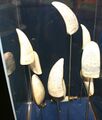Template:Selected anniversaries/April 11: Difference between revisions
No edit summary |
No edit summary |
||
| Line 11: | Line 11: | ||
||1804: Otto Linné Erdmann born ... chemist. | ||1804: Otto Linné Erdmann born ... chemist. | ||
||1810: Thomas Hornsby dies ... astronomer and mathematician. No pics online: https://www.google.com/search?q=thomas+hornsby | ||1810: Thomas Hornsby dies ... astronomer and mathematician. DOB unknown. No pics online: https://www.google.com/search?q=thomas+hornsby | ||
||1820: Karl Hermann Knoblauch born ... physicist. He is most notable for his studies of radiant heat. He was one of the six founding members of the Deutsche Physikalische Gesellschaft at Berlin on 14 January 1845. Pic. | ||1820: Karl Hermann Knoblauch born ... physicist. He is most notable for his studies of radiant heat. He was one of the six founding members of the Deutsche Physikalische Gesellschaft at Berlin on 14 January 1845. Pic. | ||
Revision as of 05:42, 21 February 2019
1789: Clockmaker Jean-André Lepaute dies. He was an innovator, introducing numerous improvements in clockmaking, especially his pin-wheel escapement, and his clockworks in which the gears are all in the horizontal plane.
1913: Physicist, inventor, and crime-fighter Nikola Tesla uses polyphase alternating current technology to detect and prevent crimes against physical constants.
1914: Mathematician Dorothy Lewis Bernstein born. She will be the first woman to be elected president of the Mathematics Association of America.
1923: Outbreak of Scrimshaw abuse in Seattle and Portland blamed on new class of crimes against mathematical constants.
1955: The Air India Kashmir Princess is bombed and crashes in a failed assassination attempt on Zhou Enlai.
1956: Art critic and alleged supervillain The Eel escapes from The Nacreum, says he has been framed for crimes he did not commit by the enemies of Cornelius Drebbel.
1962: Physicist and academic Ukichiro Nakaya dies. He created the first artificial snowflakes.
1980: Viking program: After operating on the surface of Mars for 1316 days (1281 sols), the Viking 2 lander is turned off when its batteries fail.
2006: The Venus Express spacecraft arrives at Venus after 153 days of journey, and begins continuously sending back science data from its polar orbit around Venus.
2017: Dennis Paulson calls for a moment of silence in recognition of the thirty-seventh anniversary of NASA switching off the Viking 2 spacecraft.









